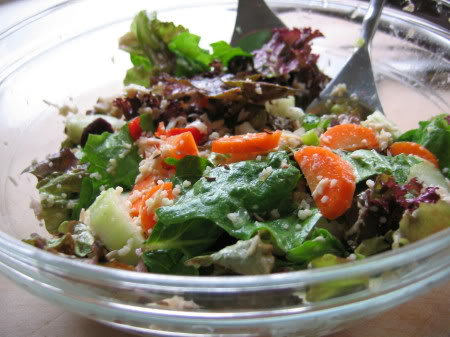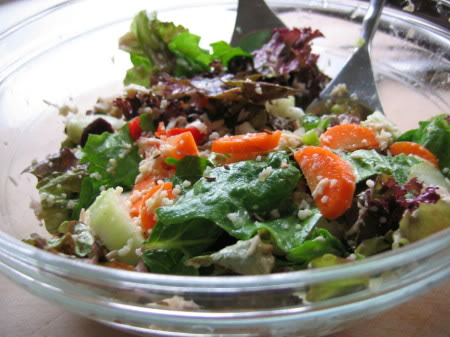
I had a difficult relationship with my grandfather. He died when I was a senior in high school, so some of it may have been simple adolescent drama. But when I look at my mom’s relationship with him, and my grandmother’s, something vaguely misogynistic emerges.
Grandpa was a large man, imposing, with beefy arms, a mostly-bald head, and big dark-rimmed glasses. In the forties and fifties he was a butcher in Roxbury, a black neighborhood in Boston, and after that he had a route selling coffee systems to offices. He and Nana raised my mother in Newton, an upper-middle class Jewish suburb. They were quite well off—my mom got a convertible for her sixteenth birthday, and her own charge cards at Filene’s and Jordan Marsh. In the years that followed they were constantly bailing my parents out of financial emergencies, and always with some sort of strings attached—often it was just the moral superiority they felt from having the money to do it. A lot of my parents’ arguments in the seventies and eighties involved my mother holding up Grandpa as a paragon of responsibility. He made sure his family was taken care of! He doted on her and my grandmother—they got anything they wanted! He did all the cooking, and paid for a cleaning lady! She’d conveniently forget the part where he knocked out her teeth one day when she was a kid, after she tried to defend her mother against him. And the fact that my parents had left Boston and moved to New York just to get away from them.
It wasn’t until well after my grandparents’ deaths that my mother learned the truth about Grandpa’s work: He was a numbers-runner for the Boston mob. He (and my grandmother) stood behind the counter of their butcher shop taking money from people who could scarcely afford it, and years later his “route” involved collecting money from other racketeers. Romantic-sounding, but that fact pulled the rug out from under my mom. Though it did explain the giant wad of bills we kids would clamor to count for him when we visited.
I seemed to hold some special interest for Grandpa. My three brothers, being boys, were given crisp five-dollar bills for good behavior. I don’t recall getting much in the way of cash—my treat was being taken to fine restaurants, so he could teach me how to Be a Lady (a none-too-subtle slap at my parents, since the implication was that they couldn’t teach me themselves). I would’ve preferred the five-dollar bills, but it was from him that I learned to put my napkin in my lap, to keep my elbows off the table, to smile and say thank you. At the same time, though, he could be abominably cruel to me, complaining about my weight or refusing to acknowledge that I was as smart or as capable as my brothers.
The summer I was twelve, my parents let me and my next-younger brother A travel unaccompanied on the bus up to Boston. We were to stay with my grandparents for two weeks. I felt like such a grown-up! It was to be quite an adventure. A and I ended up pretty miserable—my grandparents’ old-fashioned ideas of what was “normal” for pre-pubescent kids (no noise, early bedtimes, strict discipline) were difficult to adapt to, and when I got strep throat about half-way through the visit, my parents’ hurried drive up to get us felt like nothing so much as a rescue. But if there’s one good thing I remember from that trip, and many others, it was Grandpa’s bizarrely delicious tuna salad.
It was never the same twice. Besides tuna, I’m not sure it had any set ingredients. But it was ambrosial and mysterious and unpredictable, and I loved it. Grandpa would go into the cupboards and pull canned vegetables and condiments and spices and toss them all in. Sometimes corn niblets, sometimes baby white potatoes, sometimes Veg-all. Caraway seeds. Carrots. Green onion. Pickle relish. Lettuce. Maybe some mustard. Very little mayo, if he used any at all—I’m pretty sure it was mostly held together by the juices of the various ingredients. To be clear: this is eat-with-a-fork tuna salad, a Jewish Yankee’s Nicoise. This does not get put on white bread. It gets eaten out of a bowl, with napkin placed firmly in lap. The other day I had a yen for tuna with caraway seeds, so I rummaged through my fridge (how food tastes have changed: there is not a single canned vegetable in my home) and threw a whole bunch of things together. Here’s what went in:
Grandpa’s Kitchen-Sink Tuna Salad
1 can tuna
Lolla Rossa, red Boston, and romaine lettuce, torn
1 carrot, halved lengthwise and sliced
1 scallion, chopped
Dad’s Piccalilli relish [bought at a farmer’s market in Maine this summer]
Leftover couscous
4 Alfonso olives, pitted and roughly chopped
6 Pappadew peppers, quartered
½ cucumber, quartered lengthwise, seeded, and sliced
A sprinkling of caraway seeds
Dijon mustard/lemon juice/extra virgin olive oil, whisked together with
Fleur de sel
Freshly ground black pepper
Throw everything in a big bowl, toss, and eat!
